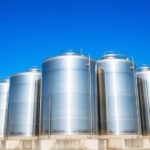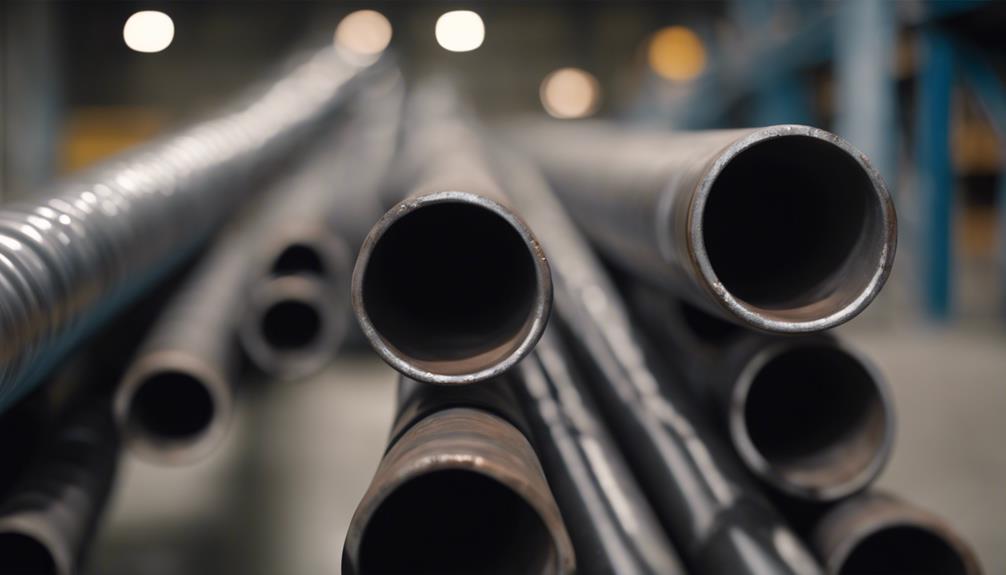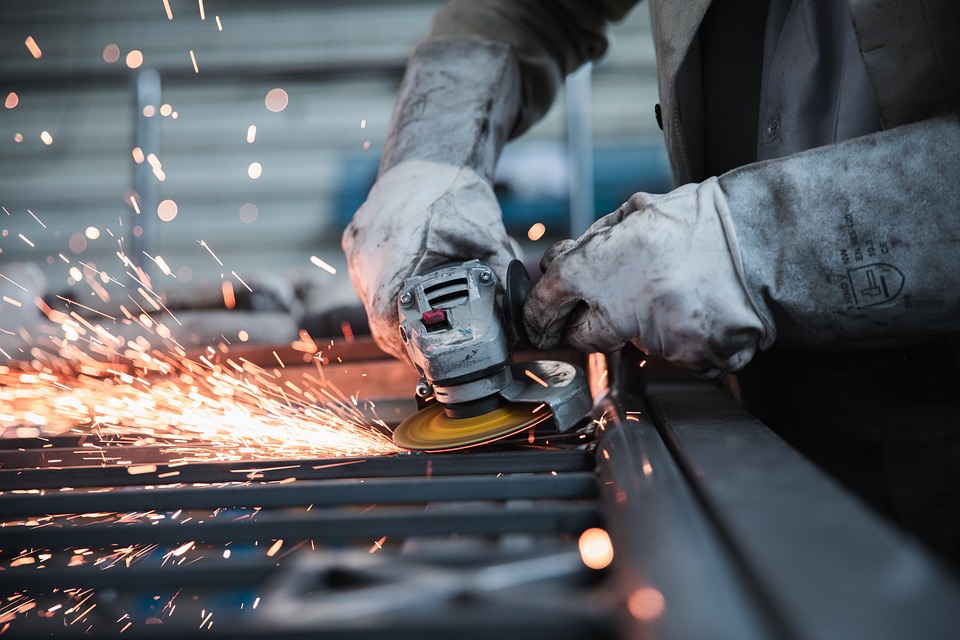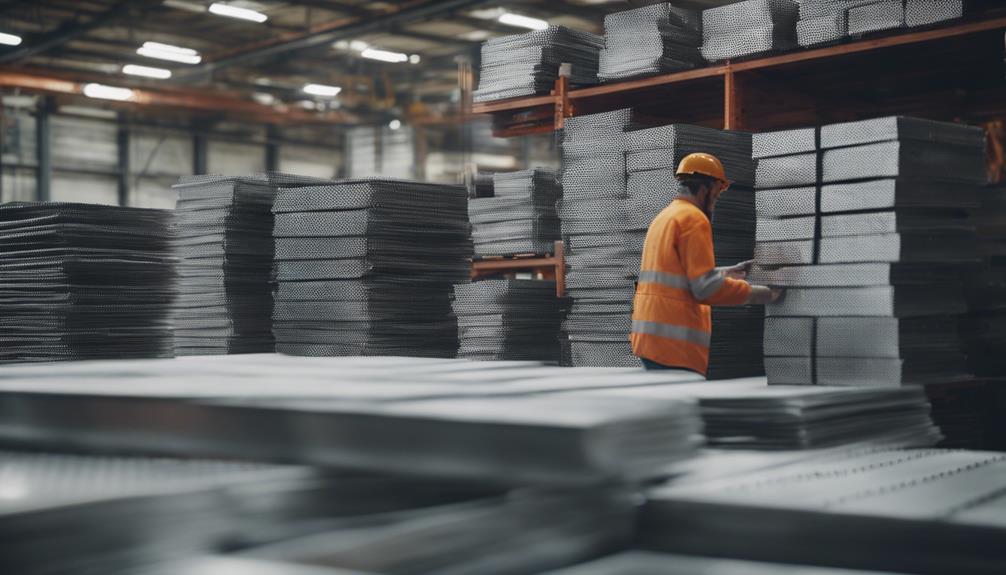Steel pipe procurement involves specifying Grade B steel for oil, gas, or water transportation applications. To guarantee peak performance, written formal quotations, and knowledge of ASTM, API, ASME standards are essential. Timely payments and adherence to industry specifications enhance efficiency. Understanding steel pipe grades, procurement best practices, and quality assurance measures are crucial steps in optimizing project outcomes. Explore further to gain in-depth insights into the process.
Key Takeaways
- Specify material details, quantity, size, and thickness for procurement accuracy.
- Utilize pipe charts for informed decisions on steel pipe selection.
- Follow ASTM, API, ASME standards to ensure quality and suitability.
- Obtain formal quotations and purchase orders for efficient transactions.
- Consider consulting industry standards like AWWA and API for precise procurement.
Steel Pipe Grades Overview
Steel pipe grades play an essential role in determining the characteristics and suitability of steel pipes for various industrial applications. When it comes to carbon steel pipes, Grade B is a commonly specified grade known for its moderate strength and good weldability. Steel pipes with Grade B are often used in low to medium pressure applications such as transportation of oil, gas, or water. Understanding the properties of Grade B carbon steel pipes is vital in ensuring the integrity and longevity of the piping systems in these applications. Engineers and project managers must carefully consider these factors when specifying Grade B carbon steel pipes to guarantee peak performance and efficiency in their projects.
Procurement Best Practices
Shifting from comprehending steel pipe grades to implementing effective procurement practices is important for ensuring the quality and efficiency of steel pipe acquisition in industrial projects. To streamline the procurement process, written formal quotations and purchase orders should specify material details, quantity, size, and thickness. It is essential to clarify non-price matters, payment terms, cash discounts, and the FOB point. Utilizing pipe charts to understand sizes and wall thickness aids in making accurate procurement decisions. Consulting industry standards such as ASTM, API, ASME, and AWWA for proper steel pipe specifications is essential. Transaction formalities, shipping instructions, and timely payments should also be considered to enhance the efficiency of steel pipe procurement.
ASTM and ASME Specifications
In the domain of steel pipe acquisition for industrial projects, an essential aspect to consider is understanding and following the detailed specifications provided by ASTM and ASME. These organizations, renowned for setting industry standards, publish specifications for various steel grades and applications. For example, ASTM A106 B is interchangeable with ASME SA106 B, especially for seamless carbon steel pipes intended for high-temperature service. Additionally, grades such as A, B, or C within the ASTM specifications indicate distinct steel characteristics based on chemical composition. To accurately order steel pipes, understanding pipe sizes as described in ANSI/ASME B36.10 and API5L pipe charts for outside diameter and wall thickness is important. Specific production and testing details outlined in ASTM or ASME specs play a significant role in ensuring the quality and suitability of steel pipes for specific project requirements.
API Standards for Steel Pipe
API standards such as API 5L play a critical role in categorizing steel pipes tailored for the oil and gas sector. API 5L pipe comes in different delivery conditions, including PSL1 and PSL2, and offers various grades like Grade B, X42, X52, and X65. When ordering API 5L pipe, buyers must specify the API standard, delivery condition, and grade required. It is essential to provide additional information beyond just the API standard to guarantee accurate purchase orders. Understanding the specifics of API 5L standards is necessary for procuring the right steel pipes for the intended application in the oil and gas industry.
Quality Assurance and Testing Procedures
When transitioning from API standards for steel pipe to quality assurance and testing procedures, ensuring adherence to industry specifications becomes paramount in the procurement process. Quality assurance in steel pipe procurement involves strict compliance with standards like ASTM, API, and ASME for material specifications. Testing procedures play a vital role, encompassing dimensional checks, visual inspections, and non-destructive testing methods to guarantee pipe integrity. Throughout manufacturing, quality control measures such as monitoring welding, heat treatment, and surface finishing processes are implemented. Third-party inspection agencies may also be engaged to verify compliance with specifications and standards. Documentation of quality assurance and testing results is essential for traceability and maintaining thorough quality records.
Value-Added Services for Procurement
Quality enhancements in steel pipe procurement encompass a range of value-added services tailored to meet specific project requirements and streamline processes efficiently. These services include processing capabilities like sawing, blasting, drilling, and tempering, offered by companies such as American Piping Products and Steel and Pipe Supply. American Piping Products also provides post-purchase services like saw and flame cutting, beveling, threading, and protective coatings. Value-added services go beyond just products, offering logistics management, testing, and product documentation and verification, ensuring a thorough solution for procurement needs. Additionally, American Piping Products stands out by providing expert guidance, assistance with project requirements, commodity pricing, and market intel, demonstrating a commitment to going the extra mile for their customers.
Steel Pipe Mill Relationships
Steel and Pipe Supply's robust connections with steel pipe mills are a cornerstone of their industry-leading inventory and service offerings. These mill relationships enable a deep inventory of carbon steel products, ensuring a diverse range of steel products in various sizes, shapes, and grades. Additionally, the strong mill relationships facilitate value-added processing services such as sawing, blasting, drilling, and tempering. This collaboration also supports private fleet operations for timely deliveries. Overall, these powerful mill relationships play a pivotal role in Steel and Pipe Supply's reputation for superior product availability and service. Their strategic partnerships with steel pipe mills allow them to meet the diverse needs of their customers efficiently and effectively.
Logistics and Supply Chain Management
Managing logistics and supply chain operations efficiently is essential for ensuring the timely delivery of steel pipes to project sites. Coordinating the transportation and storage of steel pipes with varying outside diameters and wall thickness is critical to meet project requirements. Efficient supply chain management guarantees the availability of the right steel pipes in the required quantities and quality standards. By utilizing advanced logistics systems, lead times in steel pipe procurement can be reduced, optimizing project timelines and costs. Minimizing disruptions through effective supply chain management enhances the overall success of procurement operations, ensuring that project deadlines are met without compromising on the quality or specifications of the steel pipes procured.
Carbon Steel Product Inventory
To guarantee the smooth flow of carbon steel products through the supply chain, meticulous inventory management plays an essential role in meeting project demands efficiently. American Piping Products boasts an extensive inventory of over 60,000 tons of carbon steel piping products. This inventory includes a variety of options such as ready-to-ship carbon and stainless steel piping, low temp pipes, and mechanical tubing. Customers interested in exploring the available stock can easily download the product catalog for reference. For real-time stock information and inquiries, individuals can reach out to American Piping Products at 1-800-316-5737. This robust inventory ensures that the necessary steel piping products are readily accessible for project requirements, facilitating a streamlined procurement process.
Expert Guidance for Procurement
With a wealth of industry knowledge and experience, managing the complexities of steel pipe procurement becomes more manageable with expert guidance. When seeking expert advice in steel pipe procurement, companies like American Piping Products can offer invaluable insights into selecting the right materials based on specifications such as ASTM, API, and ASME. Expert guidance guarantees a thorough understanding of important factors like yield strength, which is essential for determining a pipe's ability to withstand pressure. Additionally, relying on experts helps in deciphering pipe markings accurately to assure the desired quality and performance. By engaging with professionals in the field, businesses can streamline their procurement processes, make informed decisions, and optimize their steel pipe acquisitions effectively.
Frequently Asked Questions
What Are the 4 Types of Steel Pipes?
The four main types of steel pipes are furnace weld, electric resistance welded, seamless, and submerged arc weld. These pipes are manufactured to meet specifications set by ASTM, API, ASME, and AWWA governing bodies, essential for various applications.
What Is the Future of the Steel Pipe Industry?
The future of the steel pipe industry is poised for growth driven by infrastructure development, technological advancements, and sustainability initiatives. Increasing demand for high-strength steel pipes across various sectors and global economic recovery post-pandemic will shape industry trends.
What Are the Requirements for Steel Pipe?
Steel pipe requirements encompass various specifications like ASTM A53, A106, A795, and API 5L, tailored for different applications and grades. Understanding NPS, actual OD, wall thickness, and schedule is key to selecting the appropriate steel pipe.
Why Is Steel Pipe so Expensive?
Steel pipe prices are influenced by raw material costs, production processes, market demand, tariffs, and transportation expenses. Quality certifications, testing, corrosion protection coatings, specialized requirements, global economic conditions, geopolitical events, and industry regulations all contribute to the overall cost.










